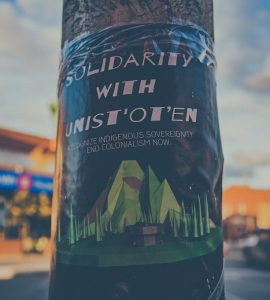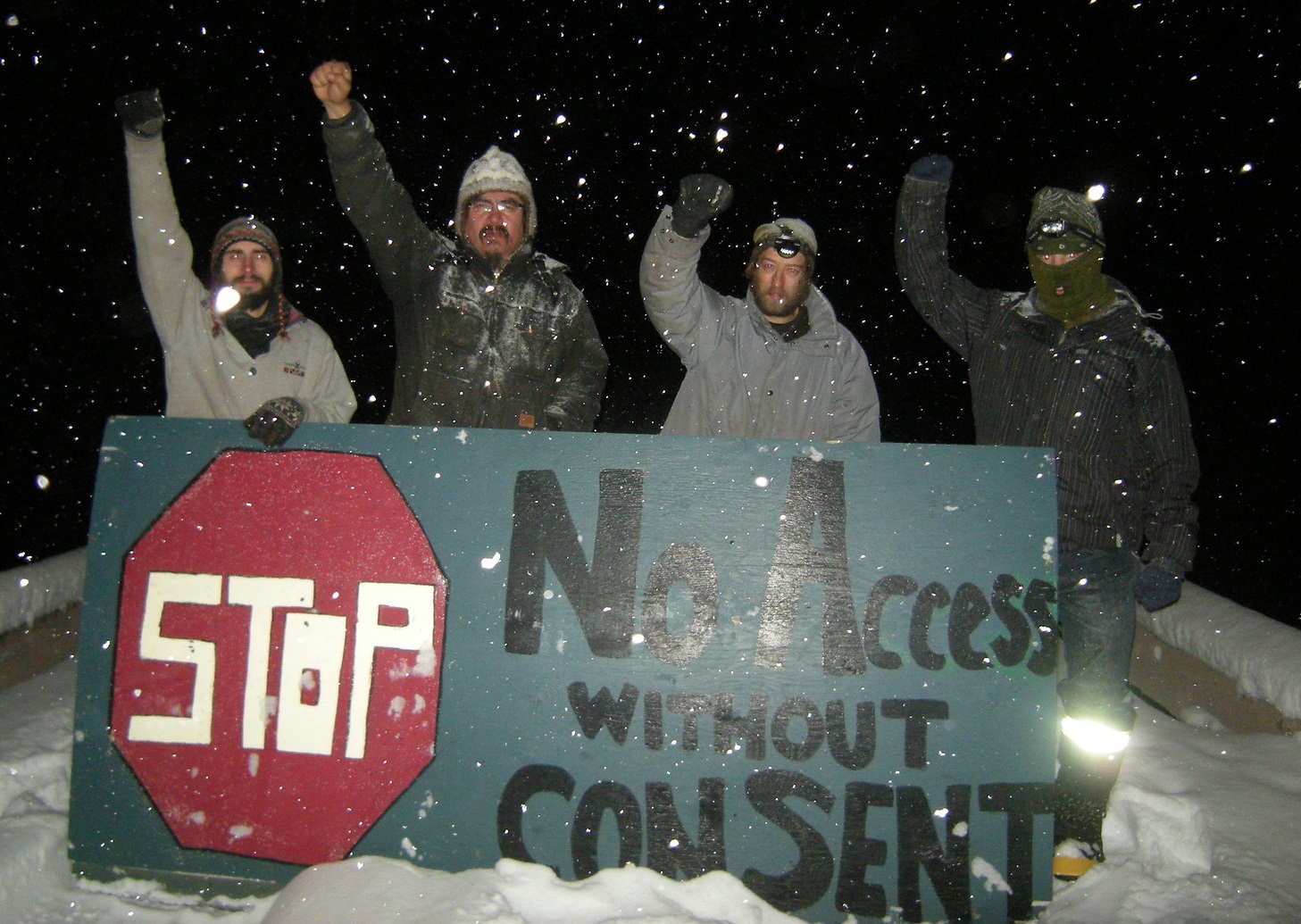As the RCMP arrests Wet’suwet’en elders on their own land to make way for a fracked gas pipeline, solidarity movements are gaining support across Canada.
In British Columbia, Canada, roughly 700 miles north of Vancouver, a situation similar to the Standing Rock protest has been nearing the boiling point. Even calling this area “British Columbia, Canada” is a misnomer, since the Wet’suwet’en land in question remains unceded by any treaty. Age-old issues of Indigenous sovereignty and violent colonialism lie at the heart of the dispute between First Nations land protectors and the combined forces of oil and gas corporations and the governments that defend them.
TC Energy, formerly TransCanada Corporation, based in Calgary, Alberta, Canada, is a major energy infrastructure company throughout North America. Coastal GasLink is TC Energy’s C$6.6 billion pipeline project, begun in 2012 and intended to transport liquefied natural gas (LNG) approximately 416 miles (670 km) from the Dawson Creek area on the northeastern border of British Columbia to Kitimat, on Canada’s west coast, where the gas would be transported by sea to Asian markets.
About 118 miles (190 km) of the planned pipeline route crosses unceded Wet’suwet’en territory. The Wet’suwet’en are governed by two sets of leaders. There are five elected band councils, some of whom have signed benefit arrangements with Coastal GasLink, agreeing to the pipeline project. However, legally speaking, it’s Wet’suwet’en hereditary chiefs who have the final say on the matter. After much deliberation, they have not consented to the planned pipeline route, which passes through culturally important sites and pristine ecological areas. Instead, they offered other potential pipeline routes through their territory, which cross land that has already been damaged by highway construction or flooding from an earlier Rio Tinto mining project. Coastal GasLink rejected the alternate routes, citing added length (and therefore cost and potential ecological damage).
The Wet’suwet’en have resorted to a physical blockade of Coastal GasLink’s operation. Two clans, the Unist’ot’en and the Gidimt’en, set up camps preventing construction of the pipeline. The Royal Canadian Mounted Police (RCMP) set up roadblocks and arrested land defenders, including Wet’suwet’en matriarchs as they were in the midst of a religious ceremony, to enforce an injunction allowing Coastal GasLinks workers to access Indigenous land and continue construction. The RCMP also threatened to arrest journalists for taking photos at the scene.
None of this gives Canada a particularly great public image, especially as reconciliation with Indigenous groups for past atrocities looms in the political background. Learning that the RCMP were prepared to use lethal force to clear Wet’suwet’en people from their own sovereign land in order to make way for fracked natural gas, corporate profits, and inevitable ecological damage, has left many saying that the reconciliation effort is dead.

What it has done, however, is spark a growing solidarity movement across Canada. Leaders from the United Church of Canada, as well as Anglican, Presbyterian, and Lutheran churches have signed a statement calling on the RCMP and Canadian government to cease their occupation of Wet’suwet’en territory. Perhaps more impactfully, other Indigenous groups have pledged to take real action in support of the Wet’suwet’en. Tyendinaga Mohawk protesters near Belleville, Ontario, set up blockades, preventing hundreds of trains from moving between Toronto, Ottawa, and Montreal. (One such blockade may cause cities to run out of chlorine for municipal water treatment.) Others blocked the Port of Vancouver and occupied governmental offices.
Blockades that cause real economic hardship have more teeth than peaceful protests that merely put moral pressure on the powers that be. They’re harder to ignore, but are also punished more harshly. (If you’re planning to join them, be prepared.) As solidarity protests spread across Canada, watch for hard-line conservatives to moan about the demise of rule of law, even as government and corporate powers flout rule of law by occupying and pillaging unceded First Nations territory without their consent.
Related: Extraction Has Victims


Join the conversation!